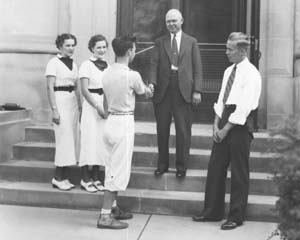
Pages: << Back 2
3 4 5
6 7
8 9 10
11
Minor
changes were effected in the organization of the College of Liberal
Arts. Speech, which had been merged briefly with English, regained
departmental independence. History and political science, which
had been under a single head in the Oxnam years, were granted separate
leadership. A similar development took place in the psychology
and education departments. The latter greatly expanded its academic
mandate in 1936 by initiating a program of training elementary school
teachers in addition to its traditional role in the preparation
of secondary school teachers and administrators. This return to
the practice of the former DePauw Normal School resulted in large
increases in enrollment, chiefly young women looking for careers
in elementary school teaching. When Professor Francis Tilden retired
in 1940, his department of comparative literature was discontinued
and some of its subject matter taught in the English department.

______________________________
With President
Wildman are students
Maurine and Helen Keller, Sam Thompson,
Park Wiseman.
__________________________________
A short-lived but very significant innovation was the creation of
a department of anthropology in the fall of 1936. Eli Lilly, grandson
of the founder and chairman of the board of the Indianapolis pharmaceutical
firm bearing the family name, who was himself an enthusiastic amateur
archaeologist, agreed to underwrite the expenses of such a department
on a trial basis for five years. Named to conduct the work of the
department was Charles F. Voegelin, a young anthropologist educated
at Stanford and the University of California. He instituted courses
in native American language and culture. With his wife, Erminie
Wheeler-Voegelin, a trained ethnologist, he carried on various research
projects on the same subjects. At the expiration of the Lilly grant
in 1941, however, the
department was discontinued for lack of funds, and the Voegelins
transferred their activities to Indiana University.
DePauw University also pioneered in the development of a systematic
student foreign exchange program. Drawing in part upon educational
contacts in his native Germany, Professor Hans Grueninger of the
German department inaugurated a series of annual exchanges of students
between DePauw and various European universities in 1935-36.
Over the next several years a few DePauw students spent their junior
year in Berlin, Cologne, or Freiburg, while students from those
institutions enrolled at DePauw. Some Greek-letter living units
cooperated with the program by providing board and room to foreign
exchange students, and the Rector Scholarship Fund made scholarship
funds available. Eventually the program was expanded to include
universities in France, Switzerland, Austria, the Scandinavian countries,
and South America, though the outbreak of the Second World War brought
about a temporary interruption of student exchanges in the years
after 1939.
 __________________________________ __________________________________
Some members of the
English faculty, including
(top) Fred L. Bergmann, Jarvis Davis, Jerome
Hixson: (bottom) Elizabeth Mullins, Ermina Mills,
Edna Taylor, Virginia Harlow, and Mary Fraley.
______________________________________
By the end of President Wildman's first five years in office-just
one-third of his 15-year tenure-DePauw University was well on its
way toward recovery from the economic crises and academic controversies
of the preceeding era. Wildman's administrative skills, tact, and
geniality had won over both faculty and students and created an
atmosphere of confidence and optimism within the entire university
constituency. But ahead lay a new disruption of normal college life
brought about by four long years of U.S. involvement in an unprecedentedly
destructive world war.
Back
to Top
Pages:
<< Back 2
3 4 5
6 7
8 9 10
11
|



 __________________________________
__________________________________